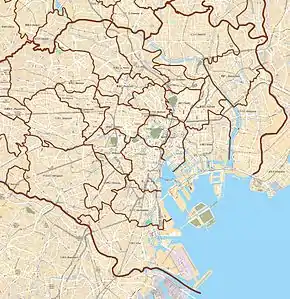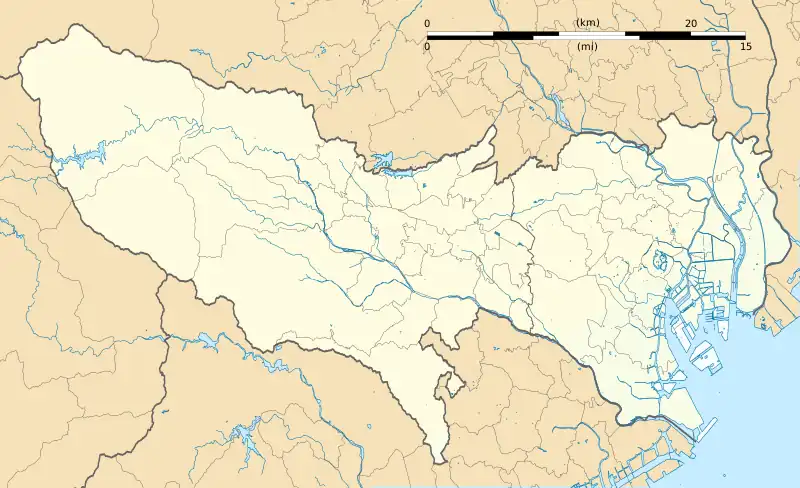Y19 Ginza-itchōme Station 銀座一丁目駅 | |||||||||||
|---|---|---|---|---|---|---|---|---|---|---|---|
 Exit 3 in April 2019 | |||||||||||
| General information | |||||||||||
| Location | 1-7-12 Ginza, Chūō-ku, Tokyo Japan | ||||||||||
| Operated by | |||||||||||
| Line(s) | Y Yūrakuchō Line | ||||||||||
| Distance | 21.7 km (13.5 mi) from Wakōshi | ||||||||||
| Platforms | 2 split-level side platforms | ||||||||||
| Tracks | 2 | ||||||||||
| Connections | G09 H09 M16 Ginza | ||||||||||
| Construction | |||||||||||
| Structure type | Underground | ||||||||||
| Platform levels | 2 | ||||||||||
| Other information | |||||||||||
| Station code | Y-19 | ||||||||||
| Website | Official website | ||||||||||
| History | |||||||||||
| Opened | 30 October 1974 | ||||||||||
| Passengers | |||||||||||
| FY2012 | 33,836 daily | ||||||||||
| Services | |||||||||||
| |||||||||||
| Location | |||||||||||
 Ginza-itchōme Station Location within Special wards of Tokyo  Ginza-itchōme Station Ginza-itchōme Station (Tokyo Bay and Bōsō Peninsula)  Ginza-itchōme Station Ginza-itchōme Station (Tokyo)  Ginza-itchōme Station Ginza-itchōme Station (Japan) | |||||||||||
Ginza-itchōme Station (銀座一丁目駅, Ginza-itchōme-eki) is a subway station on the Tokyo Metro Yurakucho Line in Chūō, Tokyo, Japan, operated by the Tokyo subway operator Tokyo Metro. It is numbered Y-19.
Lines
Sakuradamon Station is served by the Tokyo Metro Yūrakuchō Line from Wakōshi in Saitama Prefecture to Shin-Kiba in Tokyo, and is located 21.7 km from the line's starting point at Wakōshi.[1] Through services operate to and from the Tobu Tojo Line and Seibu Ikebukuro Line.
Station layout
The station consists of two split platforms above and below each other on separate levels, serving two tracks. Platform 1 (for Shin-Kiba-bound trains) is on the third basement ("B3F") level, and platform 2 (for Wakōshi-bound trains) is on the fourth basement ("B4F") level.
Platforms
| 1 | Y Yūrakuchō Line | Toyosu and Shin-Kiba |
| 2 | Y Yūrakuchō Line | for Ikebukuro, Kotake-mukaihara, and Wakoshi TJ Tobu Tojo Line for Shinrinkōen |
 Ginza-Dori Gate
Ginza-Dori Gate Platform 2, 2020
Platform 2, 2020
History
The station opened on 30 October 1974.[1] Chest-high platform edge doors were brought into use at the station from 14 April 2012.[2]
Passenger statistics
In fiscal 2012 the station was used by an average of 33,836 passengers daily.[3] The passenger figures for previous years are as shown below.
| Fiscal year | Daily average |
|---|---|
| 2010 | 34,703[4] |
| 2011 | 33,658[5] |
| 2012 | 33,836[3] |
Surrounding area
- Yurakucho Station (
 Tokyo Metro Yurakucho Line)
Tokyo Metro Yurakucho Line) - Ginza Station (
 Tokyo Metro Ginza Line,
Tokyo Metro Ginza Line,  Tokyo Metro Marunouchi Line,
Tokyo Metro Marunouchi Line,  Tokyo Metro Hibiya Line)
Tokyo Metro Hibiya Line) - Kyobashi Station (
 Tokyo Metro Ginza Line)
Tokyo Metro Ginza Line) - National Route 15 ("Chuo Dori")
- Ginza Wako
- Matsuya Co.
- Tokyo Kotsu Kaikan[6]
See also
References
- 1 2 Terada, Hirokazu (19 January 2013). データブック日本の私鉄 [Databook: Japan's Private Railways]. Japan: Neko Publishing. p. 216. ISBN 978-4-7770-1336-4.
- 1 2 各駅の乗降人員ランキング 2012年度 [Station passenger figures (fiscal 2012)] (in Japanese). Japan: Tokyo Metro. 2013. Retrieved 15 July 2013.
- ↑ 各駅の乗降人員ランキング 2010年度 [Station passenger figures (fiscal 2010)] (in Japanese). Japan: Tokyo Metro. 2011. Retrieved 15 July 2013.
- ↑ 各駅の乗降人員ランキング 2011年度 [Station passenger figures (fiscal 2011)] (in Japanese). Japan: Tokyo Metro. 2012. Retrieved 15 July 2013.
- ↑ Tokyo Kotsu Kaikan website (in Japanese)
External links
- Ginza-itchōme Station information (Tokyo Metro) (in Japanese)
35°40′27.6456″N 139°46′1.3692″E / 35.674346000°N 139.767047000°E